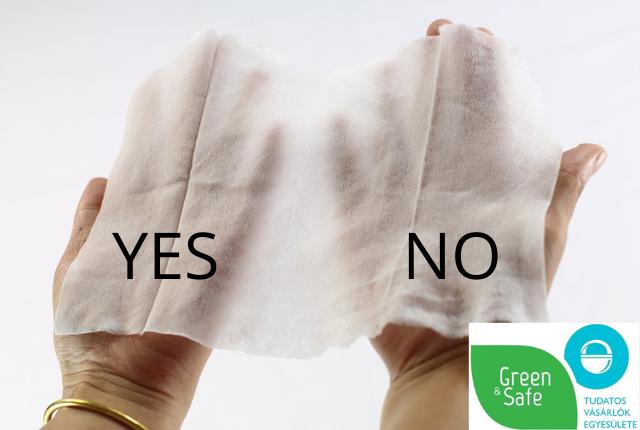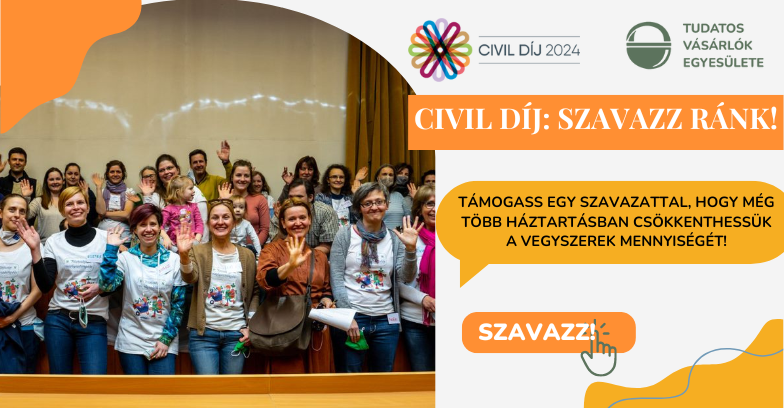
| Tudatos Vásárló Nagy Melinda
Debate over wet wipes – where do you stand?
Wet cleaning and wiping products are typically luxury items. They are polluting, might be harmful to health and there is absolutaly no need for them. Wet wipes are simple and practical. They are indispensable when it comes to taking care of a baby and it is difficult to clean the apartment without them. Below you will see pros and cons from two readers of ours. Do you use wet wipes when cleaning your home?
The number of brands launching various wet wipes suitable for surface cleaning (besides hygiene products) has been on the rise. And market analyses show that an ever greater number of these wet wipes have been actually sold. Talking about cleaning, we have spent most of our money on all-purpose cleaning products, single-use wet wipes nevertheless stand out among the most popular cleaning items. Between March 2017 and February 2018, the number of wet wipes sold went up by more than a third compared to the previous 12 months. In the mentioned period, in total we spent more than 2 billion HUF on single-use wet wipes.
An abundance of wet wipe types
Different types of wet wipes have been available in abundance. A few years ago we saw baby wipes only, however lately all types of wipes have been available in stores, such as furniture wipes, antibacterial and general surface cleaners, toilet disinfectant wipes – needless to say, all these available in several scents. Some brands (eg. CIF) offer different types of wet wipes, such as for the kitchen, bathroom and garden furniture – this latter just in case you want to wipe the garden chair off in such a special way instead of the good old water-cloth combo. Most big brands have had their own wet surface cleaner, however, the market has been dominated by trading companies’ own products.
Wet wipes seem to be similar to dill or coriander in cooking – you either love them or hate them. We asked two of our readers about which team of customers they support and why.
Erika, 33
“I love wet wipes, I think they make your life easier – in many ways. Especially baby wipes. I can’t imagine how I could have managed without them when my daughter was still a baby. While traveling, for example, I have no idea what I would have done, say on the train. I tried to use better quality wet wipes, and yes I must admit that I think there are a lot of chemicals in them, no matter how they are advertised… I still used them because I found them comfortable. Luckily, my daughter never got badly affected.
I rarely use anything like that for cleaning, but we usually do have wet toilet paper at home. I simply think that these products are practical, and I do not think that I would produce more waste than otherwise, and so far no one has been badly affected. I buy a pack of 50 pieces of wet toilet paper about twice a month. Also, I usually buy 10 pieces which I use outside my home, but I also wipe the child’s hands or my own on the playing ground, if I do not have anything else handy. What had I used before wet wipes? Tissues, I guess.”
Ildi, 38
“I do not use any kind of wet wipes – neither for cleaning my hands nor for cleaning the kitchen surfaces. I do not believe that we should disinfect everything. In addition, as far as I know, that would not be beneficial for health either because these (disinfectants) destroy useful bacteria as well.
My baby is a few months old so it would be obvious to use baby wipes, but already during my pregnancy I decided to try to avoid them – for several reasons. Firstly, my guiding principle is to consume as little as possible, especially from things that are not essential. Baby wipes, for instance, typically make no sense. Substitutes can easily be found for them.
I have no idea how long it would take for the wipes to degrade plus they may clog drains. Also, I beleive that for my child’s skin best is to simply wash with water. At the end of my pregnancy, I was consciously preparing for this. I cut and nailed small 10 × 10 centimeter pieces of textile, it was important to use cotton. I put these baby wipes in a plastic box and sprayed them with plain water before use, using an old pumped flower sprayer if needed. It feels good knowing that my baby’s skin does not get into contact with any chemical.
I do not use wet wipes whatsoever for cleaning either. I resolve cleaning with baking soda, vinegar and two rags that I usually wash out. The only thing I used to buy is paper towels, I put the vinegar solution on them when I clean the windows. Water, vinegar and a little bit of scratching – that is my method. It feels good living without chemicals. ”
Avoid using these 5 household detergents to keep your family safe
Our stance
! Expensive
It is not worth cleaning with wet wipes: a 40-piece kitchen wet wipe package is 700-800 HUF. If you use 2 wipes a day, the package will last for 20 days. The price of a one-liter all-purpose cleaning product of similar quality is also approx. 800 HUF. That can be diluted with water up to 40 times (you would use a cap of the liquid for mopping, and a few drops for wiping the surface). In addition, these products can be used not only for surface cleaning, but also for mopping.
! Full of chemicals
As we had explained it in one of our articles, it is not good for your health to regularly clean at home with antibacterial agents. Yet the instructions for use recommend the wipes (containing bacteriside and antivirals) specifically for home cleaning.
Furniture care and surface cleaners usually come in packs of 25-50 pieces, which is enough for cleaning the house approx. 10 times, although it also depends on how big the apartment is. Thus we generate waste for no reason and our hands come in contact with more chemicals than, let’s say, by dropping a few drops of furniture care on a rag or wiping the kitchen counter off with a vinegar sponge.
See the list of ingredients of a disinfectant wet wipe: <5% nonionic surfactant, cationic surfactant, oxygen based bleach / disinfectant (hydrogen peroxide); Fragrance; Limonene; Iodopropyl butyl carbamate; Disinfectant: didecyl dimethyl ammonium chloride 0.75 g (in 100 g liquid), Hydrogen peroxide 0.5 g (in 100 g liquid).
! Non-degradable plastics
Whenever you use wet wipes, you generate an “extra” chemical waste item; and the raw material of the wipes is synthetic fibres, that is, plastics, for which it takes at least one hundred years to decompose.
Manufacturers do not indicate the raw material on the packaging, and the rules do not require this information to be included in the product safety data sheet. Out of curiosity, we asked a Hungarian manufacturer that produces such products for babies and for surface cleaning. They said that the raw material they use for the wet wipes were predominantly polyester (80%) and viscose spunlace (20%), also, bioflush (made from natural materials) were used.
Although we do know that among the baby wipes on the market some are biodegradable – they are much more expensive than the non-biodegradable ones. While one average plastic baby wipe at Tesco costs about 8 HUF, one biodegradable bio-cotton baby wipe costs 37 HUF.
 Green&Safe LIFE-styles is supported by the European Union LIFE program and co-funded by the Hungrian Ministry of Agriculture. Project ID: ENV GIE HU000622 Green & Safe LIFE-styles.
Green&Safe LIFE-styles is supported by the European Union LIFE program and co-funded by the Hungrian Ministry of Agriculture. Project ID: ENV GIE HU000622 Green & Safe LIFE-styles.


